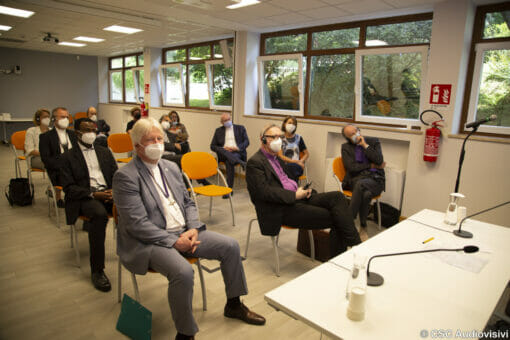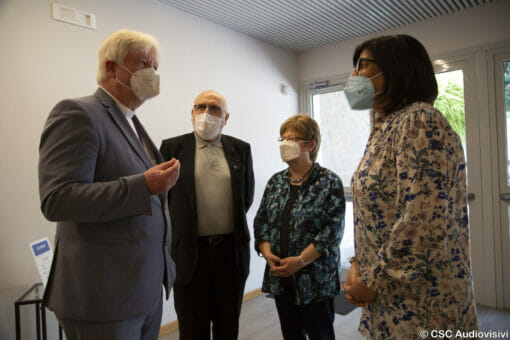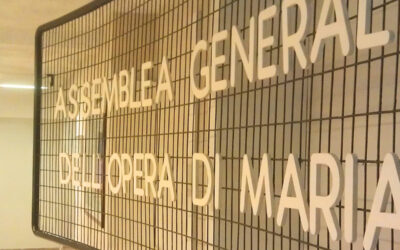The meeting with President Margaret Karram and Co-President Jesús Moran was an opportunity for mutual understanding and deep communion in the common commitment to unity.  On Saturday June 26th a delegation from the German Lutheran Church visited the International Focolare Centre in Rocca di Papa (Italy). Welcomed by Focolare President Margaret Karram and Co-President Jesús Morán, the members of the delegation also met members of Centre Uno, the movement’s centre for Christian Unity and some members of the General Council of the Movement. The delegation included Bishop Frank-Otfried July, President of the German section of the World Lutheran Federation (DKN/FLM), and Bishops Ralf Meister and Karl-Hinrich Manzke, respectively President and in charge of relations of the Union of German Lutheran Churches (VELKD) with the Catholic Church. It was an opportunity for mutual understanding and deep communion.
On Saturday June 26th a delegation from the German Lutheran Church visited the International Focolare Centre in Rocca di Papa (Italy). Welcomed by Focolare President Margaret Karram and Co-President Jesús Morán, the members of the delegation also met members of Centre Uno, the movement’s centre for Christian Unity and some members of the General Council of the Movement. The delegation included Bishop Frank-Otfried July, President of the German section of the World Lutheran Federation (DKN/FLM), and Bishops Ralf Meister and Karl-Hinrich Manzke, respectively President and in charge of relations of the Union of German Lutheran Churches (VELKD) with the Catholic Church. It was an opportunity for mutual understanding and deep communion.  Listening to each other made everyone feel like brothers and sisters already united in Christ. The meeting with President Karram and Co-President Morán, in particular, was a moment of exchange on how to face the challenges of today’s world. What emerged from the dialogue was a harmony in the “passion for unity in Christ”, which however must be extended to all humanity: evangelical love urges us to seek the sister and brother beside us. The sharing of concrete examples of evangelical life, of reconciliation even in the smallest of ways, of the choice of God in daily life, offered participants hope in the journey of unity that is being pursued also at the theological and institutional level. One of the bishops remarked: “Changing perspective means making more specific what it means to follow the Messiah. Starting with oneself, not asking what do I want to receive? But rather what do I want to give, what can I give? Whoever lives this way is inspired by the Spirit, and whoever is inspired by the Spirit is hope for the world”. The delegation was in Rome on the occasion of the commemoration of the 500th anniversary of the excommunication of Martin Luther by Pope Leo X. The excommunication came four years after the beginning of the Reformation (1517) and marked the definitive break within the Western Church. An anniversary celebrated today, however, not to sanction the split, but rather to highlight, deepen and develop the more than “fifty years of constant and fruitful ecumenical dialogue between Catholics and Lutherans” which, as the document written on the occasion of the 2016 Catholic-Lutheran Joint Commemoration of the Reformation reads, “(years that) have helped us to overcome many differences and have deepened understanding and trust between us”.[1] The day before the visit to the Focolare, Pope Francis, meeting with representatives of the Lutheran World Federation on the anniversary of the Confessio Augustana (June 25th 1530), had said among other things: “Dear brothers and sisters, on the path from conflict to communion, on the day of the commemoration of the Confessio Augustana you have come to Rome so that unity may grow among us. (…) I said ‘on the path from conflict to communion’, and this path is only made in crisis: the crisis that helps us to mature in what we are seeking. From the conflict that we have lived for centuries and centuries, to the communion that we want, and to do this we put ourselves in crisis. A crisis that is a blessing from the Lord”. [2] During their stay in Rome, the delegation of the German Lutheran Church had several meetings in the Vatican, such as the one with Cardinal Kurt Koch, president of the Pontifical Council for the Promotion of Christian Unity, during which they also discussed burning pastoral issues such as, for example, the admission of the non-Catholic partner to the Eucharist in mixed marriages. Among the meetings planned, besides the one with the Focolare Movement, there was also one with the Community of Sant’Egidio.
Listening to each other made everyone feel like brothers and sisters already united in Christ. The meeting with President Karram and Co-President Morán, in particular, was a moment of exchange on how to face the challenges of today’s world. What emerged from the dialogue was a harmony in the “passion for unity in Christ”, which however must be extended to all humanity: evangelical love urges us to seek the sister and brother beside us. The sharing of concrete examples of evangelical life, of reconciliation even in the smallest of ways, of the choice of God in daily life, offered participants hope in the journey of unity that is being pursued also at the theological and institutional level. One of the bishops remarked: “Changing perspective means making more specific what it means to follow the Messiah. Starting with oneself, not asking what do I want to receive? But rather what do I want to give, what can I give? Whoever lives this way is inspired by the Spirit, and whoever is inspired by the Spirit is hope for the world”. The delegation was in Rome on the occasion of the commemoration of the 500th anniversary of the excommunication of Martin Luther by Pope Leo X. The excommunication came four years after the beginning of the Reformation (1517) and marked the definitive break within the Western Church. An anniversary celebrated today, however, not to sanction the split, but rather to highlight, deepen and develop the more than “fifty years of constant and fruitful ecumenical dialogue between Catholics and Lutherans” which, as the document written on the occasion of the 2016 Catholic-Lutheran Joint Commemoration of the Reformation reads, “(years that) have helped us to overcome many differences and have deepened understanding and trust between us”.[1] The day before the visit to the Focolare, Pope Francis, meeting with representatives of the Lutheran World Federation on the anniversary of the Confessio Augustana (June 25th 1530), had said among other things: “Dear brothers and sisters, on the path from conflict to communion, on the day of the commemoration of the Confessio Augustana you have come to Rome so that unity may grow among us. (…) I said ‘on the path from conflict to communion’, and this path is only made in crisis: the crisis that helps us to mature in what we are seeking. From the conflict that we have lived for centuries and centuries, to the communion that we want, and to do this we put ourselves in crisis. A crisis that is a blessing from the Lord”. [2] During their stay in Rome, the delegation of the German Lutheran Church had several meetings in the Vatican, such as the one with Cardinal Kurt Koch, president of the Pontifical Council for the Promotion of Christian Unity, during which they also discussed burning pastoral issues such as, for example, the admission of the non-Catholic partner to the Eucharist in mixed marriages. Among the meetings planned, besides the one with the Focolare Movement, there was also one with the Community of Sant’Egidio.
Heike Vesper
[1] Joint Declaration on the occasion of the Joint Catholic – Lutheran Celebrations of the Reformation, Lund (Sweden), October 31st 2016 at https://www.vatican.va/content/francesco/en/events/event.dir.html/content/vaticanevents/en/2016/10/31/joint-declaration.html [2] Talk of Pope Francis to representatives of the World Lutheran Federation, Rome (Italy) June 25th 2021 at https://www.vatican.va/content/francesco/en/speeches/2021/june/documents/20210625-lutheran-federation.html




0 Comments